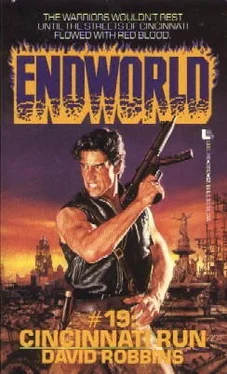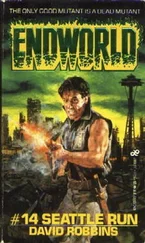David Robbins - Cincinnati Run
Здесь есть возможность читать онлайн «David Robbins - Cincinnati Run» весь текст электронной книги совершенно бесплатно (целиком полную версию без сокращений). В некоторых случаях можно слушать аудио, скачать через торрент в формате fb2 и присутствует краткое содержание. Город: New York, Год выпуска: 1989, ISBN: 1989, Издательство: Leisure Books, Жанр: sf_postapocalyptic, Боевая фантастика, на английском языке. Описание произведения, (предисловие) а так же отзывы посетителей доступны на портале библиотеки ЛибКат.
- Название:Cincinnati Run
- Автор:
- Издательство:Leisure Books
- Жанр:
- Год:1989
- Город:New York
- ISBN:978-0843928921
- Рейтинг книги:3 / 5. Голосов: 1
-
Избранное:Добавить в избранное
- Отзывы:
-
Ваша оценка:
- 60
- 1
- 2
- 3
- 4
- 5
Cincinnati Run: краткое содержание, описание и аннотация
Предлагаем к чтению аннотацию, описание, краткое содержание или предисловие (зависит от того, что написал сам автор книги «Cincinnati Run»). Если вы не нашли необходимую информацию о книге — напишите в комментариях, мы постараемся отыскать её.
Cincinnati Run — читать онлайн бесплатно полную книгу (весь текст) целиком
Ниже представлен текст книги, разбитый по страницам. Система сохранения места последней прочитанной страницы, позволяет с удобством читать онлайн бесплатно книгу «Cincinnati Run», без необходимости каждый раз заново искать на чём Вы остановились. Поставьте закладку, и сможете в любой момент перейти на страницу, на которой закончили чтение.
Интервал:
Закладка:
His vision of his death, however, was premature.
Even as the soldiers were turning, the man who was recognized by the Family as the greatest gunfighter in the 105-year history of their survivalist group, the man who was renowned in the Freedom Federation for his lightning speed and unerring accuracy, was flipping onto his back, his arms sweeping up and out, the Colt Pythons gleaming in the late afternoon sun. Three shots boomed as one.
The soldiers never knew what hit them. One moment they were about to slay a giant in a black leather vest, and the next blackness engulfed them as a hollow-point slug passed completely through their head from back to front, exploding their foreheads outward in a spray of flesh, blood, and brains. All three sprawled to the asphalt, the AK-47s falling from their limp fingers.
Blade surged erect and looked at the jeep.
Geronimo had the driver’s door wide, and was covering the soldier behind the wheel with his SAR.
“Like I said, pard. A piece of cake.”
Blade turned.
Hickok was already erect, inspecting the troopers to insure they were lifeless.
“Thanks,” Blade stated. “Jenny was almost a widow.”
“I’d do the same for any other klutz.”
Blade unslung the AR-15. “Here. Haul the bodies into the brush while I talk to the driver.”
Hickok came over, holstered his left colt, and took the rifle. “Why am I doing all the heavy work on this run?”
“You can use the exercise.”
“How do you figure that?”
“You were the one who couldn’t outrun an overfed pack of farm dogs,” Blade remarked, and headed for the jeep.
“ Somebody around here definitely needs a vacation,” Hickok muttered.
Blade ignored the gunman and hurried to the vehicle. “At least we got one,” he commented to Geronimo.
“What was that move you pulled?” Geronimo inquired. “Were you trying to make them laugh so hard they’d drop their weapons?”
“Go help Hickok,” Blade stated. “After the bodies are concealed, strip off the uniforms. I’ll keep an eye on our friend.” He pointed the Commando at the driver.
“I am not your friend, pig!” the soldier snapped. He was in his thirties, a husky trooper with sandy hair and blue eyes. His pudgy features were set defiantly, and his double chin quivered as he tried to suppress his rage at the deaths of his comrades.
“Oink,” Geronimo said, and jogged toward Hickok.
“Put the jeep in park and raise your hands,” Blade commanded.
The trooper glowered at the giant. “You will pay for what you have done, bastard!”
“Do it or die,” Blade stated grimly.
His lips curling in a scowl, the pudgy Russian stared at the Commando for a second, then complied.
“What’s your name?” Blade asked.
“Vsevolod Fedorov.”
“How about if I just call you Fred?”
“Screw you, shithead.”
Blade took a step nearer and smacked the Commando barrel against the trooper’s nose.
Fedorov screeched and cupped his hands over his nostrils. “Damn you! You broke it!” he cried.
“Not yet,” Blade responded, “but I will if you give me any more lip. Now raise those hands!”
Hesitantly, tears of frustration welling in his eyes, his nose throbbing in anguish, Fedorov slowly elevated his arms.
“That’s better. Are you based in Cincinnati?”
Fedorov gazed straight ahead, deliberately averting his eyes. His lips twitched, but he refused to answer.
Blade sighed and touched the barrel to the soldier’s left cheek. “I don’t have time to play games with you. If you won’t tell me what I want to know, I’ll kill you now and find another Russian trooper who will.”
Fedorov looked at the Warrior with hatred in his eyes. “Who are you kidding? You’ll kill me anyway, whether I talk or not. So shoot me and get it over with!”
“If you cooperate, I won’t kill you.”
“Ha! I don’t believe you.”
Blade shrugged. “Suit yourself. I’ve given you my word, but if you want to die needlessly, that’s your business.”
“I’m not a traitor.”
“Of course you’re not. You’re a loyal Communist and you believe in every word of The Communist Manifesto.”
Fedorov’s forehead furrowed.
“You’re ready to die for Mother Russia, the country you were born and reared in,” Blade went on, knowing full well that his statements were inaccurate. During the course of the Family’s previous dealings with the Soviets, the Warriors had learned crucial details concerning the Russian invasion of America.
The Soviet Union had successfully occupied a section of the eastern United States during the war, but their drive in the west, a push through Alaska and western Canada spearheaded by armored divisions, was stopped cold in British Columbia by the harshest winter weather in centuries. The Russians consolidated their iron grip on the territory they controlled in the eastern U.S., but a severe shortage of armaments, ammunition, general supplies, and replacement personnel prevented them from penetrating past the Mississippi River or expanding into the deep South. For 70 years they maintained communications with the Motherland. The commanders of the Russian occupation forces pleaded for more troops, more tanks, and more supplies. Except for infrequent shipments, their pleas were largely ignored.
The Soviet Union was having problems of its own. Russia’s industrial capacity had been reduced to almost nil by the American nuclear strikes, and the U.S.S.R. rapidly depleted its natural resources. To compound the Communists’ problem, that which they feared most happened; the ethnic groups they had oppressed for scores of years finally saw their chance and rebelled. The Tartars and the Baits, the Mordivians and the Udmurts, and every other group the Communist Party had tyrannized rose up against their former masters.
To their dismay, the Russian forces in America became stranded, trapped in the very country they had sought to conquer. All broadcasts and cryptographic contact with the Soviet Union inexplicably ceased. A few ships and planes were sent to investigate and never returned. Thrown on their own resources, with their provisions low and their morale even lower, the Russian commanders established a dictatorial system as ruthless as Stalin’s. Slave-labor camps were set up, summary executions were conducted routinely, and an American branch of the KGB went into operation. All industries still operational were rechanneled for Soviet purposes. The section of America under Communist rule became a carbon copy of the Motherland.
The Russians were able to manufacture the ammunition they required for their AK-47s and other small arms. Their helicopter fleet was their primary military focus; every available plant capable of being modified to produce helicopter parts was put into service. Their efforts to keep their jets in the air, however, met with failure. They lacked the resources and facilities to construct the specialized jet parts, and eventually their Air Force consisted solely of helicopters.
Another major problem involved their shortage of replacement personnel. They realized attrition would gradually reduce their force to undesirable levels unless drastic measures were taken. So a system of modified racial breeding was instituted, in which selected American women were forcibly impregnated and compelled to give birth. The children were then turned over to the State and raised in Russian-regulated dormitories, where they were subjected to intensive indoctrination. Communism was extolled, Russian history and values were inculcated, and every aspect of the education and training the orphans received was designed to create soldiers and citizens as loyal as they would have been had they been reared in the U.S.S.R.
Читать дальшеИнтервал:
Закладка:
Похожие книги на «Cincinnati Run»
Представляем Вашему вниманию похожие книги на «Cincinnati Run» списком для выбора. Мы отобрали схожую по названию и смыслу литературу в надежде предоставить читателям больше вариантов отыскать новые, интересные, ещё непрочитанные произведения.
Обсуждение, отзывы о книге «Cincinnati Run» и просто собственные мнения читателей. Оставьте ваши комментарии, напишите, что Вы думаете о произведении, его смысле или главных героях. Укажите что конкретно понравилось, а что нет, и почему Вы так считаете.












